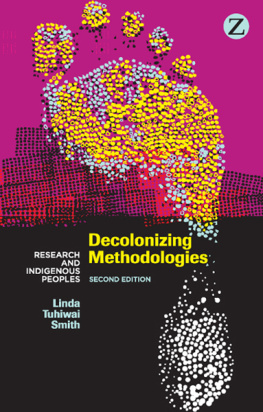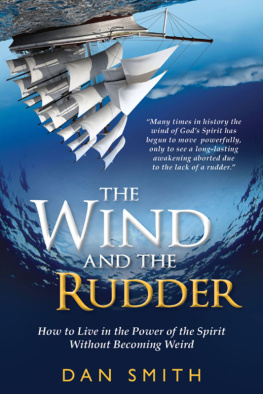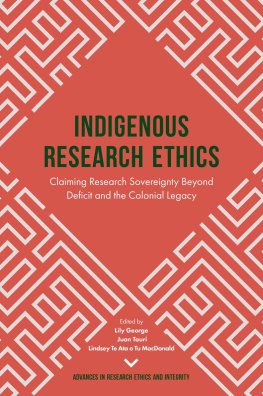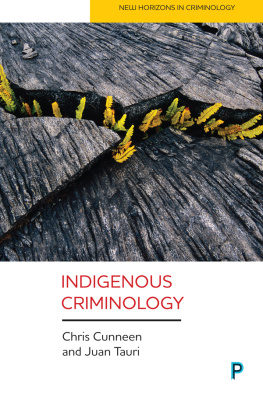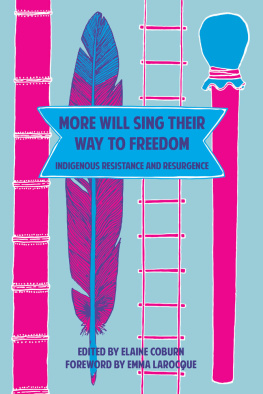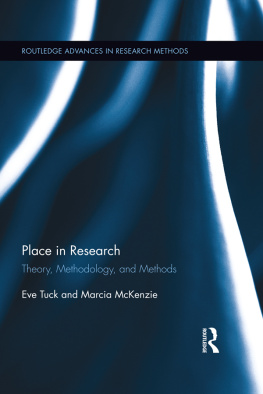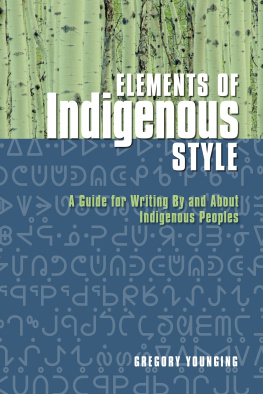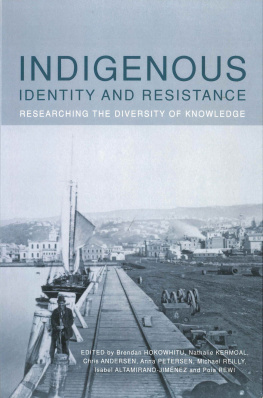
About the Author
Linda Tuhiwai Smith (Ngati Awa and Ngati Porou) is a Professor of Education and Maori Development and Pro-Vice-Chancellor Maori at the University of Waikato in Hamilton, New Zealand .
Praise for the first edition
This book is a counter-story to Western ideas about the benefits of the pursuit of knowledge. Looking through the eyes of the colonized, cautionary tales are told from an indigenous perspective, tales designed not just to voice the voiceless but to prevent the dying of people, of culture, of ecosystems. The book is particularly strong in situating the development of counter-practices of research within both Western critiques of Western knowledge and global indigenous movements. Informed by critical and feminist evaluations of positivism, Tuhiwai Smith urges researching back and disrupting the rules of the research game toward practices that are more respectful, ethical, sympathetic and useful vs racist practices and attitudes, ethnocentric assumptions and exploitative research. Using Kaupapa Maori, a fledgling approach toward culturally appropriate research protocols and methodologies, the book is designed primarily to develop indigenous peoples as researchers. In short, Tuhiwai Smith begins to articulate research practices that arise out of the specificities of epistemology and methodology rooted in survival struggles, a kind of research that is something other than a dirty word to those on the suffering side of history.
Patti Lather, Professor of Educational Policy and Leadership, Ohio State University, and author of Getting Smart: Feminist Research and Pedagogy with/in the Postmodern and Troubling the Angels: Women Living with HIV/AIDS
Finally, a book for researchers working in indigenous contexts. Finally, a book especially for indigenous researchers. Linda Smith goes far beyond decolonizing research methodology. Our contextual histories, politics, and cultural considerations are respectfully interwoven together. Our distinctiveness remains distinct, but there are important places where our issues and methodologies intersect. Stories of research experiences, examples of projects, critical examination, and mindful reflection are woven together to make meaningful and practical designs related to indigenous issues and research.
Jo-Ann Archibald, Sto:lo Nation and Director of the First Nations House of Learning at the University of British Columbia
A book like this is long overdue. It will be most useful for both indigenous and non-indigenous researchers in educational and non-educational institutions. It will empower indigenous students to undertake research which uses methods that are culturally sensitive and appropriate instead of those which they have learned about in Research Methods courses in universities which assume that research and research methods are culture-free and that researchers occupy some kind of moral high ground from which they can observe their subjects and make judgements about them.
Konai Thaman, Professor of Pacific Education and Culture, and UNESCO Chair of Education, University of the South Pacific
Linda Tuhiwai Smith is the leading theorist on decolonization of Maori in New Zealand. This book opts for a dynamic interpretation of power relations of domination, struggle and emancipation. She uses a dual framework the whakapapa of Maori knowledge and European epistemology to interpret and capture the world of reality for a moment in time. Thus the search for truth in complex human relations is a never-ending quest.
Ranginui Walker, formerly Professor of Maori Studies Department and Pro-vice Chancellor, University of Auckland
We have needed this book. Academic research facilitates diverse forms of economic and cultural imperialism by shaping and legitimating policies which entrench existing unjust power relations. Linda Tuhiwai Smiths powerful critique of dominant research methodologies is eloquent, informed and timely. Her distinctive proposals for an indigenous research agenda are especially valuable. Decolonization, she reminds us, cannot be limited to deconstructing the dominant story and revealing underlying texts, for none of that helps people improve their current conditions or prevents them from dying. This careful articulation of a range of research methodologies is vital, welcome and full of promise.
Laurie Anne Whitt, Professor of Philosophy, Michigan Technological University
A brilliant, evocative and timely book about an issue that serves to both define and create indigenous realities. In recent years, indigenous people, often led by the emerging culturally affirmed and positioned indigenous scholars, have intensified the struggle to break free from the chains of colonialism and its oppressive legacy. In writing this book, Linda Tuhiwai Smith makes a powerful and impassioned contribution to this struggle. No budding researcher should be allowed to leave the academy without reading this book and no teacher should teach without it at their side.
Bob Morgan, Director, Jumbunna Caiser, Centre for Aboriginal and Torres Strait Islanders, University of Technology, Sydney
Decolonizing Methodologies: Research and Indigenous Peoples , second edition, was first published in 2012 by Zed Books Ltd, 7 Cynthia Street, London N1 9JF, UK and Room 400, 175 Fifth Avenue, New York, NY 10010, USA
The first edition was first published in the United Kingdom and the United States of America in 1999 by Zed Books Ltd.
www.zedbooks.co.uk
Copyright Linda Tuhiwai Smith 2012
The rights of Linda Tuhiwai Smith to be identified as the author of this work has been asserted by her in accordance with the Copyright, Designs and Patents Act, 1988
Designed and typeset by Kate Kirkwood
Index by John Barker
Cover design by www.seshdesign.com
All rights reserved. No part of this publication may be reproduced, stored in a retrieval system or transmitted in any form or by any means, electronic, mechanical, photocopying or otherwise, without the prior permission of Zed Books Ltd.
A catalogue record for this book is available from the British Library
Library of Congress Cataloging in Publication Data available
ISBN: 9781848139534
Acknowledgements
Ahakoa he iti, he iti pounamu.
Although small, it is precious.
I would like to thank the following people, individuals and organizations for their support and assistance in preparing this book: Graham Hingangaroa Smith, Kuni Jenkins, Margie Kahukura Hohepa, Patricia Maringi Johnston, Leonie Pihama, Cherryl Waerea-I-te-rangi Smith, Roger Dale, Alison Jones, Stuart McNaughton, Judith Simon, James Marshall, Betsan Martin, Kay Morris-Matthews, Michael Peters, the students of the Here Wananga programme, Research Unit for Maori Education, University of Auckland, students of Te Whare Wananga o Awanuiarangi, the University of Auckland Research Committee, indigenous colleagues from Canada, Australia, Hawaii and the United States, and others who have supported and encouraged.
For their technical support I would particularly like to thank Brenda Liddiard Laurent, Eleanor Tedford and Tommy Perana. For valuable feedback on my writing style I thank Jenny McKnight.
For their constant support many thanks to my whanau , particularly my parents Hirini and June Mead, my sisters Aroha and Hinauri, husband Graham and daughter Kapua, sister-in-law Cherryl Wairea-I-te-rangi, my other Mum Paea and other extended family members just for being who they are.
Foreword
This book explores the intersection of two powerful worlds, the world of indigenous peoples and the world of research. They are two important worlds for me: I move within them; in one sense I was born into one and educated into the other. I negotiate the intersection of these worlds every day. It can be a complicated, challenging and interesting space. When Decolonizing Methodologies was first published in 1999, indigenous activists were engaged with states and governments in the drafting of a proposed United Nations Declaration on the Rights of Indigenous Peoples, commonly known as The Draft Declaration . At the same time the world of research through its institutions, disciplines and communities was concerned about educational and economic reforms and grappling with the advent of the Internet and other technologies. Today, the UN Declaration on the Rights of Indigenous Peoples is official, albeit signed belatedly by my own country of New Zealand, and research institutions have been so transformed by technology that it is hard to imagine carrying out teaching or research without access to the Internet and digital technologies.
Next page
